Related Research Articles

Fishing is the activity of trying to catch fish. Fish are often caught as wildlife from the natural environment, but may also be caught from stocked bodies of water such as ponds, canals, park wetlands and reservoirs. Fishing techniques include hand-gathering, spearing, netting, angling, shooting and trapping, as well as more destructive and often illegal techniques such as electrocution, blasting and poisoning.

Chilika Lake is the largest brackish water lagoon in Asia and second largest coastal lagoon in the world, spread over the Puri, Khordha and Ganjam districts of Odisha state on the east coast of India, at the mouth of the Daya River, flowing into the Bay of Bengal, covering an area of over 1,100 square kilometres (420 sq mi).

The Little Rann of Kutch is a salt marsh which is part of the Rann of Kutch in Kutch district, Gujarat, India.
In economics, a common-pool resource (CPR) is a type of good consisting of a natural or human-made resource system, whose size or characteristics makes it costly, but not impossible, to exclude potential beneficiaries from obtaining benefits from its use. Unlike pure public goods, common pool resources face problems of congestion or overuse, because they are subtractable. A common-pool resource typically consists of a core resource, which defines the stock variable, while providing a limited quantity of extractable fringe units, which defines the flow variable. While the core resource is to be protected or nurtured in order to allow for its continuous exploitation, the fringe units can be harvested or consumed.

Veraval is a city and the headquarters of Gir Somnath district in the Indian state of Gujarat. Somnath temple, a place of pilgrimage due to its importance as Jyotirlinga site dedicated to Hindu deity Shiva, is located here. It is also known for the hub of fishing industries in India.

Artisanal fishing consists of various small-scale, low-technology, low-capital, fishing practices undertaken by individual fisherman. Many of these households are of coastal or island ethnic groups. These households make short fishing trips close to the shore. Their produce is usually not processed and is mainly for local consumption. Artisan fishing uses traditional fishing techniques such as rod and tackle, fishing arrows and harpoons, cast nets, and small traditional fishing boats. For that reason, socio-economic status of artisanal fishing community has become an interest of the authorities in recent years.
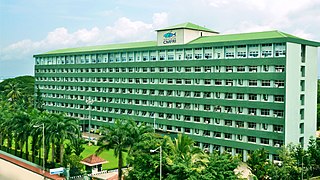
The Central Marine Fisheries Research Institute was established in the government of India on 3 February 1947 under the Ministry of Agriculture and Farmers Welfare and later, in 1967, it joined the Indian Council of Agricultural Research (ICAR) family and emerged as a leading tropical marine fisheries research institute in the world. The Headquarters of the ICAR-CMFRI is located in Kochi, Kerala. Initially the institute focused its research efforts on creating a strong database on marine fisheries sector by developing scientific methodologies for estimating the marine fish landings and effort inputs, taxonomy of marine organisms and the biological aspects of the exploited stocks of finfish and shellfish on which fisheries management were to be based. This focus contributed significantly to development of the marine fisheries sector from a predominantly artisanal, sustenance fishery till the early sixties to that of a complex, multi-gear, multi-species fisheries.
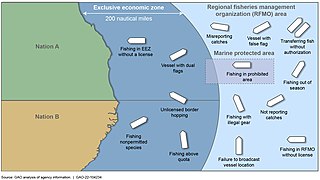
Illegal, unreported and unregulated fishing (IUU) is an issue around the world. Fishing industry observers believe IUU occurs in most fisheries, and accounts for up to 30% of total catches in some important fisheries.

The fishing industry in Scotland comprises a significant proportion of the United Kingdom fishing industry. A recent inquiry by the Royal Society of Edinburgh found fishing to be of much greater social, economic and cultural importance to Scotland than it is relative to the rest of the UK. Scotland has just 8.4 per cent of the UK population but lands at its ports over 60 per cent of the total catch in the UK.
South Indian Federation of Fishermen Societies (SIFFS) is a non-governmental organization (NGO) working in the marine fisheries sector. SIFFS is the apex body of organizations of small-scale artisanal fish workers based out at Thiruvananthapuram in Kerala. It has a three-tier organisational structure.

Fishing in India is a major sector within the economy of India contributing 1.07% of its total GDP. The fishing sector in India supports the livelihood of over 28 million people in the country, especially within the marginalized and vulnerable communities. India is the third largest fish producing country in the world accounting for 7.96% of the global production and second largest producer of fish through aquaculture, after China. The total fish production during the FY 2020-21 is estimated at 14.73 million metric tonnes. According to the National Fisheries Development Board the Fisheries Industry generates an export earnings of Rs 334.41 billion. Centrally sponsored schemes will increase exports by Rs 1 lakh crore in FY25. 65,000 fishermen have been trained under these schemes from 2017 to 2020. Freshwater fishing consists of 55% of total fish production.

India–Pakistan maritime trespassing refers to the frequent trespassing and violation of respective national territorial waters of India and Pakistan in peacetime. Most trespassing is common to Pakistani and Indian fishermen operating along the coastline of the Indian state of Gujarat and the Pakistani province of Sindh. Recently the Indian Coast Guard apprehended a Pakistani fishing boat along the Gujarat coast and arrested 14 fishermen of the neighbouring nation. Most violations occur due to the absence of a physical boundary and lack of navigational tools for small fishermen. Hundreds of fishermen are arrested by the Coast Guards of both nations, but obtaining their release is difficult and long-winded owing to the hostile relations between the two nations.
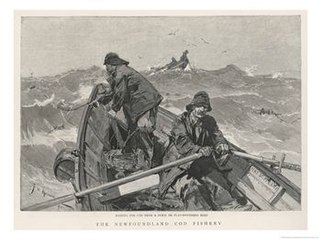
Cod fishing in Newfoundland was carried out at a subsistence level for centuries, but large scale fishing began shortly after the European arrival in the North American continent in 1492, with the waters being found to be preternaturally plentiful, and ended after intense overfishing with the collapse of the fisheries in 1992.

Until the 1960s, agriculture and fishing were the dominant industries of the economy of South Korea. The fishing industry of South Korea depends on the existing bodies of water that are shared between South Korea, China and Japan. Its coastline lies adjacent to the Yellow Sea, the East China Sea and the Sea of Japan, and enables access to marine life such as fish and crustaceans.

Odisha, a state in eastern India, is extremely diverse and gives the state abundance of natural beauty and wildlife. The districts in the interior are thickly covered by tropical moist deciduous and tropical dry deciduous forests. The hills, plateaus and isolated areas of the northeastern part of the state are covered by the tropical moist deciduous forests whereas the dry deciduous forests are located in the southwest region of the state. Some of the trees which grow in abundance in Odisha are bamboo, teak, rosewood, sal, piasal, sanghvan and haldi. There are 479 species of birds, 86 species of mammals, 19 species of amphibians and 110 species of reptiles present in Odisha. The state is also an important habitat for the endangered olive ridley turtles and Irrawaddy dolphins. Koraput district of southern Odisha has been identified by Food and Agriculture Organisation (FAO) of UN as Global Agricultural Heritage site which is among only other three sites in the world. Other sites are in Peru, China and Philippines.
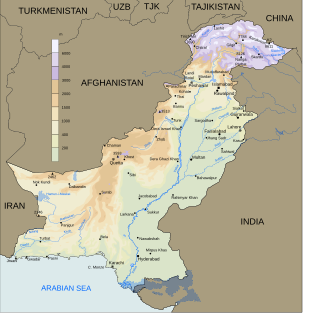
The fishing industry plays a significant part in the national economy of Pakistan. With a coastline of about 1,120 km, Pakistan has enough fishery resources that remain to be developed. Most of the population of the coastal areas of Sindh and Balochistan depends on fisheries for livelihood. It is also a major source of export earning.
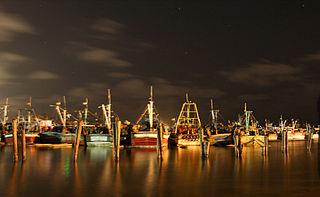
Royapuram fishing harbour, also known as Chennai fishing harbour or Kasimedu fishing harbour, is one of the major fishing grounds for catching fishes and crustaceans located at Kasimedu in the Royapuram area of Chennai, India. The harbour is located north of the Chennai Port and is under the administrative control of the Chennai Port Trust. The harbour is also a shipbuilding facility, chiefly building fishing boats. The nearest railway station is the Royapuram Railway Station.

The 2002 West Bengal cyclone was a deadly tropical cyclone that affected India and Bangladesh in November 2002. The sixth tropical cyclone and fourth cyclonic storm of the 2002 North Indian Ocean cyclone season, it developed in the Bay of Bengal northeast of Sri Lanka on November 10, as a tropical depression. After tracking northeast, the system strengthened into a cyclonic storm on November 11, as maximum sustained winds exceeded 65 km/h (40 mph). On November 12, it further intensified into a severe cyclonic storm. Later that day, the storm made landfall on Sagar Island in West Bengal with winds of 100 km/h (60 mph). After moving inland, it rapidly weakened and dissipated over Bangladesh on November 12.

The Fishery Survey of India (FiSI), founded in 1983 by the Government of India's Ministry of Agriculture & Farmers Welfare, for the fisheries studies, research and survey of the traditional and deep sea fisheries of India within India's Exclusive economic zone, is tasked with the preparation of an annual Fishery Resources Survey and "Assessment and Research Programme" for the sustainable fishery requirements of traditional fishermen, small and medium boat operators and industrial fleet of deep-sea longlining tuna fishing.
The fishing industry in Thailand, in accordance with usage by The World Bank, the UN's Food and Agriculture Organization (FAO) and other multinational bodies, refers to and encompasses recreational fishing, aquaculture, and wild fisheries both onshore and offshore.
References
- ↑ "What We Do - PFF". Archived from the original on September 5, 2010.
- ↑ "Announcements to abolition the Contract system on Inland fisheries in Sindh". Archived from the original on October 3, 2011.
- ↑ "Four Pakistani prisoners released from Gujarat jails". DeshGujarat. June 30, 2010.
- ↑ "India, Pakistan exchange lists of prisoners" (News article). The Indian Express. The Indian Express Limited. 2 April 2008. Retrieved 9 May 2012.
- ↑ "India to stop fishermen from straying into Pakistan". Reuters. Thomson Reuters. 7 April 2008. Archived from the original on March 5, 2016. Retrieved 9 May 2012.